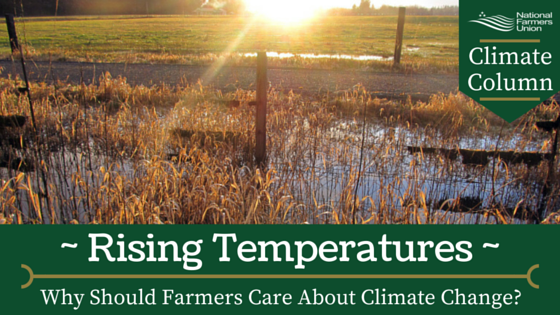 By Tom Driscoll, NFU Director of Conservation Policy and Education
By Tom Driscoll, NFU Director of Conservation Policy and Education
According to the USDA-led report Climate Change and Agriculture in the United States: Effects and Adaptation, “The entire United States is likely to warm substantially over the next 40 years, with an increase of 1° to 2° C over much of the country.” USDA’s Regional Vulnerability Assessments explain that increases in extreme heat, and shorter, warmer winters are anticipated in most of the designated Climate Hub Regions.
What does that mean for your farm? It depends where you are and what you produce. For example, this Northern Plains Climate Hub report notes that rising temperatures can worsen pest and weed pressure for crops, give nutritionally inferior invasive species greater advantages in grazing lands, and dampen livestock performance, possibly even increasing mortality.
The assessment also notes that corn and soybeans have displaced several other crops in North and South Dakota due to warming temperatures and longer growing seasons. The infrastructure necessary to support the production of these displaced crops may atrophy from lack of use, further accelerating concentration in corn and soybeans. Excessive reliance on just two crops leaves local economies vulnerable to market difficulties or catastrophic crop failure.
No matter where you live across the U.S., it’s likely climate change is already affecting, or will affect your operation in the future through direct impacts on your farm or ranch, changes in market behavior, impacts on transportation and distribution, or some combination of the three. NFU encourages farmers to check out USDA’s Climate Hubs for information specific to your region. As serious as the challenges rising temperatures related to climate change are, farmers have lots of options for fighting climate change and adapting to difficulties that cannot be avoided.
Have you noticed temperatures rising where you live? Let us know in the comments below!
Like what you’ve read? Check out our Climate Leaders home page, join the conversation in the NFU Climate Leaders Facebook Group, and keep up-to-date with NFU climate action by signing up for the mailing list.

